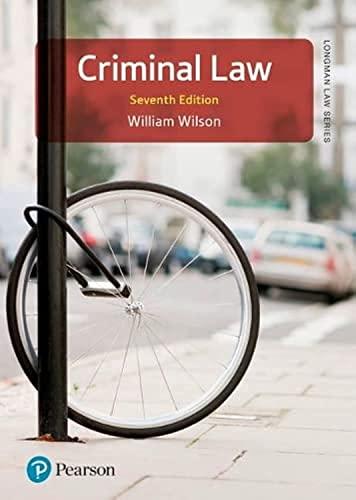Question
Detective Brad Milton of the New Castle County Police Department and other police officers executed a search warrant at Roberts' home in Wilmington. Roberts was
Detective Brad Milton of the New Castle County Police Department and other police officers executed a search warrant at Roberts' home in Wilmington. Roberts was not home but his mother was. Det. Milton asked her to have Roberts contact him in reference to a robbery investigation.
Roberts called Det. Milton the next day and agreed to come to the police station. He drove himself there. Det. Milton took Roberts into an interview room and the two started to speak around 9:40 a.m. The conversation in that room lasted until 12:15 p.m. At no time during the interview or outside did Det. Milton advise Roberts of his Miranda rights. He started to on several occasions but was distracted by Roberts' questions, where Roberts asked if he was being arrested every time Det. Milton started telling him hisMirandarights.
Roberts was not arrested during the taped interview session. Det. Milton did inform Roberts on several occasions that he was going to be arrested. Indeed, Det. Milton left no doubt of that.
During the interview, Det. Milton made it clear he wanted Roberts to confess to him then and not later. The reasons, he repeatedly stated, were that if Roberts confessed, "cooperated," Det. Milton would make that known to the magistrate setting bail. Also, the detective said he would make it known to the prosecutor that Roberts had cooperated.
Det. Milton also described unfavorable consequences that would follow from not cooperating at the moment and delaying his arrest. These consequences included a high bail amount and a longer sentence. In short, as their discussion continued, Det. Milton made it clear that to obtain favorable treatment, Roberts had to make his statement then before he left.
After this discussion about the consequences of not cooperating, Roberts confessed to the robbery. Despite his assurance to Roberts that he would be arrested, Det. Milton let Roberts leave after concluding their interview.
Question 1 (6 points)
What level of suspicion didDet.Milton need to obtain a search warrant for Roberts' house?
Question 1 options:
| Reasonable Suspicion | |
| A Hunch | |
| Probable Cause | |
| Proof Beyond a Reasonable Doubt |
Question 2 (7 points)
DidDet.Milton have the requisite level of suspicion needed to obtain a search warrant for Roberts' house?
Question 2 options:
| Yes, because the Detective sought and received a search warrant. | |
| No, becuase the Detective tricked Roberts into meeting. him at the diner. | |
| Yes, because Robert confessed to the robbery. | |
| No, because the Detective only interviewed Robert after searching his home. |
Question 3 (7 points)
What level of suspicion did Det. Milton need to ask Robert to speak with him at the police station?
Question 3 options:
| Probable Cause | |
| Reasonable Suspicion | |
| A Hunch | |
| No level of suspicion was needed. |
Question 4 (7 points)
DidDet.Milton violate the Fourth Amendment by asking Roberts to contact him and come down to the police station to talk?
Question 4 options:
| Yes, the police cannot reach out to speak to a suspect without triggering the Fourth Amendment. | |
| No, inviting a person to a police station does not trigger the Fourth Amendment. | |
| Yes, whenever the police invite a suspect to the police station the Fourth Amendment is triggered. | |
| No, ordering a suspect to a police station does not trigger the Fourt Amendment. |
Question 5 (7 points)
What situation triggers the constitutional requirement to provide Miranda warnings to a suspect.
Choose all that apply.
Question 5 options:
| The suspect is not free to leave. | |
| The suspect is guilty. | |
| The suspect is asked questions. | |
| The suspect is in a police station. |
Question 6 (7 points)
WasDet.Milton required to inform Roberts of his Miranda rights?
Question 6 options:
| No, because Roberts came to the station voluntarily and was never told he could not leave. | |
| Yes, because Roberts was in the police station and being questioned about a crime. | |
| Yes, because Roberts was told he was going to be arrested. | |
| No, because regardless of what Det. Miller said, Roberts was eventually able to leave the police station. |
Question 7 (7 points)
Would Roberts' confession at trial violate the Fifth Amendment?
Question 7 options:
| Yes, because Roberts relied onDet.Miller's promises of leniency before he confessed. | |
| Yes, because Roberts was not read his Miranda rights before he confessed. | |
| No, because the Miranda rule had not yet been triggered by Det. Miller's conduct. | |
| No, because it does not matter if a suspect is read their Miranda rights, it is only a suggestion for a best practice by police. |
Step by Step Solution
There are 3 Steps involved in it
Step: 1

Get Instant Access to Expert-Tailored Solutions
See step-by-step solutions with expert insights and AI powered tools for academic success
Step: 2

Step: 3

Ace Your Homework with AI
Get the answers you need in no time with our AI-driven, step-by-step assistance
Get Started


